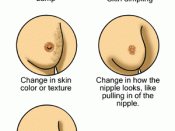The effects of plastic on health and the environment has received media attention lately. In this paper I will discuss the threats that plastic pose to our health especially its involvement in breast cancer, reducing sperm count and still births., causing me to wonder about the safety and environmental impact of all types of plastics. I consulted a number of web-sources fro this paper, among which google proved to be the best search engine and generated the most relevant results.
Plastic products are a part of our life now. With the advantage that they have of being unbreakable, people tend to prefer plastic to wrap or contain food and beverages and therefore cancer-causing agents because they can sometimes leach out of the plastic and migrate into the food, find a way to affect human lives. The scientists found that this was especially true after heating or when the plastic is old or scratched (Holton, 23).
Development of breast cancer entails multiple events, in which estrogen appears to play an important role. Estrogenic agents involved in breast development and possibly in breast cancer may include foreign estrogens, or xenoestrogens, that are used in manufacturing a number of products (Richard, et al, 55). PA (bisphenol A) is a synthetic resin used in food packaging and polycarbonate plastic products. BBP (n-butyl benzyl phthalate) is a widely used plasticizer used in food wraps and cosmetics. It encodes a key enzyme of the GABA-ergic system, which could be involved in hormonal regulation and breast cancer development (www.foodnavigator.com/).
Two ingredients of common household plastics may cause genetic changes in breast tissue, raising the possibility of a link with cancer. The chemicals can sometimes leach out of plastic containers or cling film and migrate into food, especially after heating. The ingredients, BPA and BBP, are hormone-like chemicals...



Yes plastic is dangerous
people do not seem to know about that and sometime tend to put any kind of plastic in the microwave with their food. this is a dangerous behavior since plastic may contain cancerigen particles that may influence replication of DNA and cause irreversible mutation, mutation that are not picked up by system such as base pair repair, nucleotide excision repair and base excision repair.
0 out of 0 people found this comment useful.